Freedom Writers: Express Yourself
Research Information to assist in creating a timeline:
Britannica High School Edition
Excellent database and good for subject overview. Has photos, graphs, and stats.
 SIRS Issues Researcher
SIRS Issues Researcher
Outstanding... statistics, news, information in multiple formats,
and study tools. To access from home get username and password from staff.
United States History in Context ![]()
Genocide in the Twentieth Century
The History Place
What are crimes against humanity?
Defined by the International Criminal Court
Religious persecution is widespread, report warns
By Richard Allen Greene, CNN
April 29, 2010
Religious persecution articles from the Huffington Post
The Ethnic Apartheid in Myanmar | Stanley Weiss World Post, Huffington Post
Armedian Genocide
from History.com

Armenian Genocide of 1915: An Overview
by John Kifner, New York Times
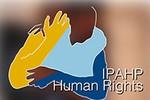
Acts of Genocide Since World War II from the Inter-Parliamentary Alliance for Human Rights and Global Peace
Genocide in Darfur from United Human Rights Council
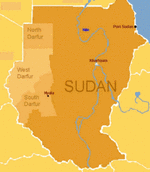
Democratic Republic of the Congo
Global History: Human Rights
"Throughout global history, various groups have been persecuted due to ethnic background, gender, religious preference, or political affiliation. The methods of persecution have ranged from the restricting of social and political rights, to even death. The world has often turned a blind eye to human rights violations. This began to change after the Holocaust of the 20th century when the newly formed United Nations published its Universal Declaration of Human Rights."
The Universal Declaration of Human Rights
All members of the human race are entitled to certain inalienable rights that protect their dignity. Mankind should universally enjoy freedom of speech and belief as well as freedom from fear and want. The Universal Declaration of Human Rights ensures these rights regardless of race, color, sex, language, religion, nationality, or status. This document forbids slavery, torture, discrimination in legal matters, and arbitrary detention. All people are entitled to a fair trial and remedies for acts that violate their rights. The General Assembly of the United Nations agreed on this document. http://www.un.org
Religious Persecution
Conflict between different religious beliefs and philosophies has led to human rights violations throughout history. Perhaps the best known example of religious persecution is the genocide of the Jewish people under Hitler. Persecution in the form of restrictions on where they could live or work soon turned to murder. A more recent example is the violence between Hindus and Muslims in India and Pakistan, or the long history of violence between Protestants and Catholics in Ireland. http://regentsprep.org
Syria's Christians Find Themselves, Once Again, Persecuted and Taxed for Their Religion
Syrian Christians are being taxed by Islamic extremists for protection. The early Christian church began in Syria, when Saint Paul was converted on the road to Damascus. Now, Christians are in the minority. The Ancient Romans taxed and persecuted Christians, and so have the Muslim rulers. The special tax, known as Jizya, is the only alternative to becoming Muslim. Christians in Syria say that such protection is a myth, and that the regime is only interested in its own interests. http://www.pri.org
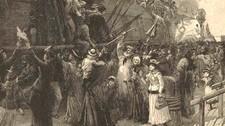
Irish people left their county in the mid-1800s to escape religious persecution, poverty, famine and death. Some came for adventure. It is estimated that over 4.5 million Irish people arrived in the United States between the 1840s and the 1920s. This article from the Understanding Race web site discusses the different groups of European immigrants and explains the reasons for and the causes of the potato famine. Learn about the nativist political movement by the Know-Nothing Party and see why this group wanted to limit immigration from Catholic countries and restrict Catholic immigrants in many other ways. http://www.understandingrace.org
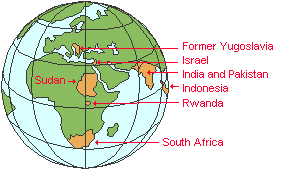
Recent hotspots of severe racism
In this lecture for students describing ethnicity or the characteristics that separate one culture from another, we also learn about the influence of relationships that are formed outside of these boundaries of social or cultural separation. The information features color photographs of different ethnic groups and uses maps of regions around the world to illustrate global trends as a result of assimilation or intermarriage during the nineteen seventies and eighties. The page links to definitions of challenging vocabulary words include audible pronunciation cues. http://anthro.palomar.edu
Ethnic Persecution
Throughout the world, persecution has occurred due to ethnic differences. From the Irish Potato Famine to wars in the Balkans, you can learn about ethnic violence, starvation, and genocide against ethnic minorities. Read about the imprisonment, executions, and denial of human rights that occurred in Russia under Stalin. Discover the impact of Imperialism and tribalism in Africa on violence, civil war, and genocide. Understand why Irish farmers were starving in spite of successful crops of wheat and oats. Investigate ethnic cleansing in Bosnia and ethnic violence in Kosovo. http://regentsprep.org
Refugees in Utah: Immigrants Today
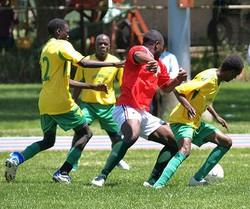
Utah has always been a place for refugees since the Mormons first came there to escape persecution. The United States accepts about 80,000 refugees a year, people looking for political or religious asylum. About ten percent of them go to Utah. Refugees have often lived for years in refugee camps, camping in tents without electricity or plumbing. They may have never experienced a grocery store, microwave, refrigerator, flushing toilet, television, computer, or snow. The language and food are unfamiliar and they may have never gone to school before.
http://ilovehistory.utah.gov
What Is Genocide?
For genocide to begin, a group is seen as different. They are excluded and given symbols to set them apart. Others don't treat them with respect or dignity. They are seen as less than human. Laws may forbid them from interacting with other groups. Genocide is carefully planned out and prepared for with propaganda. The group may be separated out into a ghetto. After all this, extermination begins. Perpetrators cover up the evidence and try to escape justice. http://www.theholocaustexplained.org
Ethnic Conflict
This web site attempts to educate people on the 20th century trend of ethnic cleansing. It highlights several different conflicts, including the Holocaust. This site uses easy to read language and has links on words that you might not recognize. Overall, this web site will give background information on what the problem is, who has created it, and what we can learn from it. http://www.regentsprep.org
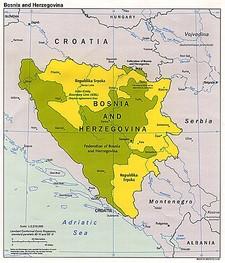
When Bosnia declared independence from Yugoslavia in 1992 the violence from the Bosnian War escalated. The war lasted over three years. Examine the reasons for the Bosnian War beginning with territorial control by the different ethnic groups in Bosnia-Herzegovina. Find out about the ethnic cleansing that took place during the war and the mass genocide that happened in Srebrenica. This article from the U.S. Department of State discusses the role of the United States and of the United Nations during the war in Bosnia. http://history.state.gov
Bosnia War Children Live in Hope
When the war in Bosnia ended in 1995, two young Muslim survivors of the siege at Mostar shared their story. They were survivors of the ethnic cleansing. They came to their home and told 11-year-old Mirad and 13-year-old Alem that they had to leave and live on the other side of the river. Mirad's cousin was captured, his village was burned, and he saw people die. A decade later, Mirad was studying to be a doctor and his family home in Mostar had been rebuilt. Alem couldn’t be found, but he said he would never forget what had happened. http://news.bbc.co.uk
Rwanda: A Brief History of the Country
Rwanda was once a sanctuary from violence, but the Tutsi were hunted down and called cockroaches and snakes. They were hated, harassed, beaten, and killed. Schools, churches, and maternity hospitals were attacked. About 85% of the Rwandan population is Hutu. Before colonial times, Tutsi were the higher social class. They had the power, and received tribute in exchange for protection. Germany controlled Rwanda before World War I, but Belgium controlled it after. The Hutu peasants rose up violently against the Tutsi when the Tutsi tried to stop democracy. Up to a million Tutsi were killed in the genocide. URL: http://www.un.org
“Separate free schools shall be established for the education of children of African descent; and it shall be unlawful for any colored child to attend any white school, or any white child to attend a colored school.”
—Missouri, 1929
Jim Crow Laws
In Birmingham in 1930, it was illegal for a black and a white person to play cards or checkers together. In Nebraska in 1911, it was illegal for a white person to marry someone who was at least one-eighth African or Chinese. In Missouri in 1929, it was illegal for black children to attend white schools or for white children to attend black schools. African-Americans had separate waiting rooms, train cars, neighborhoods, and swimming pools.
http://americanhistory.si.edu
- EResources
- Ebooks
- Contests and Opportunities
- Faculty Resources
- Library Good Reads
- GradPoint (opens in new window)
- LibGuides
- NHS Library Seminars (opens in new window)
-
Historical Links
- Immigrant Groups in the West
- Immigrant Groups in the West Making the Connections
- Immigration Symbols
- Immigration West
- Industrial Revolution Resources List
- Industrialists
- Korean War
- Legacy of Jim Crow
- The 60's
- Women and the Industrial Revolution
- Working Women and the Industrial Revolution
- Working Women During the Industrial Revolution
- Against Slavery
- Immigration
- Louis Braille An Exceptional Man
- MLA and APA Style Guides
- Norwood High School Home
- Quick reference
- Research & Instruction
- Summer Work
- Textbooks
This site provides information using PDF, visit this link to download the Adobe Acrobat Reader DC software.
